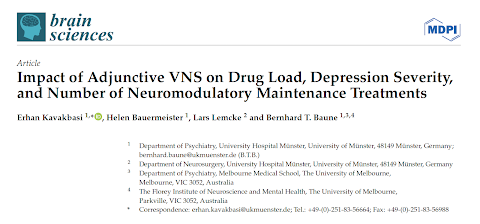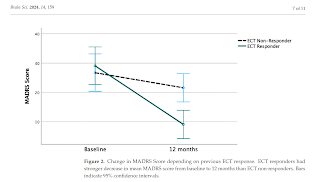Effect of VNS on Maintenance Treatments: New Study Secondary Analyses
Out on PubMed, from authors in Germany and Australia, is this paper:
Impact of Adjunctive VNS on Drug Load, Depression Severity, and Number of Neuromodulatory Maintenance Treatments.
Vagus nerve stimulation (VNS) is a long-term adjunctive treatment option in patients with difficult-to-treat depression (DTD). A total of n = 20 patients (mean age 52.6 years) were included in the multicenter, prospective, observational, naturalistic RESTORE-LIFE study and were treated with adjunctive VNS as an add-on to treatment as usual. Exploratory and secondary outcome parameters from a single center were investigated for this present analysis. The overall mean drug load slightly decreased from 4.5 at baseline to 4.4 at 12 months (Z = -0.534, p = 0.594). The drug load was lower in previous electroconvulsive therapy (ECT) responders than in non-responders. There was a reduction in the mean number of hospitalizations per month after VNS implantation (Z = 1.975, p = 0.048) and a significant decrease in the mean Montgomery Åsberg Depression Rating Scale (MADRS) score from 27.3 at baseline to 15.3 at 12 months (T = 4.230, degree of freedom (df) = 19, p = 0.001). A history of ECT response at baseline was associated with greater improvement in the MADRS score after 12 months of VNS (F = 8.171, p = 0.013). The number of neuromodulatory maintenance treatments decreased during the follow-up period. In summary, there was an alleviation in the burden of illness among DTD patients treated with VNS.
Keywords: difficult-to-treat depression; electroconvulsive therapy; esketamine; medication load; treatment-resistant depression; vagus nerve stimulation.
Brain Sci. 2024 Feb 4;14(2):159. doi: 10.3390/brainsci14020159.PMID: 38391733

The abstract is copied below:
Vagus nerve stimulation (VNS) is a long-term adjunctive treatment option in patients with difficult-to-treat depression (DTD). A total of n = 20 patients (mean age 52.6 years) were included in the multicenter, prospective, observational, naturalistic RESTORE-LIFE study and were treated with adjunctive VNS as an add-on to treatment as usual. Exploratory and secondary outcome parameters from a single center were investigated for this present analysis. The overall mean drug load slightly decreased from 4.5 at baseline to 4.4 at 12 months (Z = -0.534, p = 0.594). The drug load was lower in previous electroconvulsive therapy (ECT) responders than in non-responders. There was a reduction in the mean number of hospitalizations per month after VNS implantation (Z = 1.975, p = 0.048) and a significant decrease in the mean Montgomery Åsberg Depression Rating Scale (MADRS) score from 27.3 at baseline to 15.3 at 12 months (T = 4.230, degree of freedom (df) = 19, p = 0.001). A history of ECT response at baseline was associated with greater improvement in the MADRS score after 12 months of VNS (F = 8.171, p = 0.013). The number of neuromodulatory maintenance treatments decreased during the follow-up period. In summary, there was an alleviation in the burden of illness among DTD patients treated with VNS.
Keywords: difficult-to-treat depression; electroconvulsive therapy; esketamine; medication load; treatment-resistant depression; vagus nerve stimulation.
The report is here.
And from the text:
Here's another VNS paper (see also blog post of Feb. 15, 2024). Having options for depression treatment is good, and VNS may be an option for a small number of patients.
"Difficult-to-treat-depression" (DTD) may be a useful conceptual extension of "treatment-resistant depression."
The data presented here, from a cohort of 20 patients with VNS, show modest benefits of VNS as adjunctive maintenance treatment.
That previously ECT-responsive patients fare better with VNS may be because ECT response is a marker for more "biological" depression, versus complex illness with mulitple comorbidities, including personality disorder. (The authors note that "severe personality disorder" was an exclusion criterion.)
Finally, it is noted and disclosed that the study was sponsored by the VNS manufacturer.









At Georg August University Göttingen, we've recently been informed that MDPI (including journals like Brain Sciences, in which this article was published) is seen as a predatory publisher with very low scientific standards. More information can be found (also in English) in a newsletter from the University President: https://news.uni-goettingen.de/blog/2023/11/03/1739/
ReplyDelete